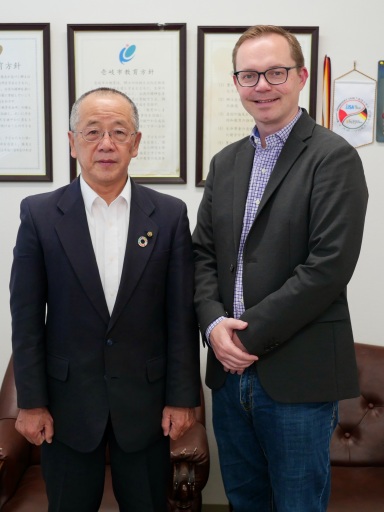This month I was in Unseen Japan for a piece called How Schools on Remote Japanese Islands are Fighting Depopulation→
In that article I detail the genesis of the study abroad program my family and I went on for our year on Iki Island (see FAQ). In writing the article I had the pleasure of interviewing one of the driving personalities of the program, Superintendent Kubota Yoshikazu.
I wanted to take a moment to tell you a little more about him, since he featured a lot in our life on Iki. The Iki School District office is high on a bluff above the elementary school my kids attended, in the northeast part of the island. When the four major towns of Iki merged a few years back in a cost-cutting measure (one of the ways remote areas deal with depopulation and smaller tax bases), the town hall of Ashibe was turned into the main school building for all the schools on the island. Kubota-sensei works from this office, but often drives down to the biggest town Gō-no-ura to attend meetings at city council.
I was able to visit him a few times in his Ashibe office, sitting across from him on a low leather lounge. One of the remarkable things about him is how intently he listens to people around him speak. Then, when it is his turn to talk, he has a gentle low voice that brings about a hush in the room.
Kubota-sensei’s short-cropped hair seems the type for a former high school baseball coach (he coached my friend who runs the Wasabi guest house — see the video tour in this post — back when he was in high school) but actually it is because he is from a line of Nichiren priests. His temple is just at the foot of the hill below the District building. For Kubota-sensei, educating children is his number one priority. He said the job requires trust and moral fibre, so feels the temple members are proud of what he is doing.
When Kubota-sensei is not on school or temple business, he is often picking fruit from the trees around his house. Often we would get a knock at the door at our house and he would be standing there in his rubber boots with a bag full of biwa or other seasonal fruit or garden vegetable. His granddaughter would come over with all the neighbourhood kids to play hide-and-go-seek and eat snacks in our house.
I would like to thank Kubota-sensei for accepting a weird Canadian family into his school district with open arms. Him and his team did everything they could to make our stay comfortable, and to help our kids adjust to life in Japanese school. And he was gracious enough to sit down with me for a couple of hours to discuss education theory and the thinking behind the Ikkiko remote island study program. 本当にお世話になりました!
If you want to read more about the program, take a look at my article in Unseen Japan →


